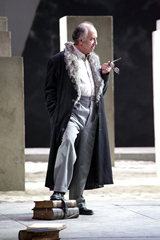| Opera Reviews | 19 April 2024 |
Nello Santi returns to Milan for Nabuccoby Silvia Luraghi |
|
| Verdi: Nabucco Teatro alla Scala, Milan 4 November 2017 |
|
|
The reason for this dazzling success is largely to be attributed to conductor Nello Santi's return to Milan. The aged Maestro, who conducted La traviata earlier this season and is expected again for Aida next spring, bowed respectfully to the audience after reaching the podium with enthusiastic applause, repeated after the opera’s overture. Nabucco, of course, is one of Verdi’s most popular titles, featuring the all-time favorite chorus “Va pensiero”, along with other famous numbers that contributed to keeping hold of the audience's attention. The Daniele Abbado production, revived from the 2012-13 season and also shown at Covent Garden, transformed the deeds of the Jews into a somber holocaust premonition. The sets and costumes by Alison Chitty plainly pointed in this direction. The curtain rose on a gray lit cemetery, remindful of the Berlin Holocaust Memorial, with the Jews helplessly moving among the tombstones, doubled by video projections seemingly mirroring the stage from above. When Abigaille learns about her obscure origin, a flame of fire rises in the background with a premonition of doom. In the third act, the distressed Jews gather in the desert to mourn their lost homeland. They then come back with confidence and sing “Immenso Jeovha” with renewed strength. In the title role, Leo Nucci, now in his mid-seventies, seems to be enjoying a perennial youth: his bronze colored baritone remains perfectly tuned, his breath control is also perfect, and allows him to produce an outstanding combination of piani and forti that depict the lunatic character of the Babylonian king. Less compelling was soprano Martina Serafin as Abigaille. From her appearance on stage, her voice sounded out of control at the top: she was audibly more at ease with the piani, and earned a well-deserved applause at the end of her pondering aria “Anch’io dischiuso un giorno”. Tenor Stefano La Colla as Ismaele and mezzo Annalisa Stroppa formed a nice lyrically sounding couple, while bass Mikhail Petrenko as Zaccaria looked impressive for his imposing stage presence and theatrical skills, while the volume of his voice sounded somewhat reduced. The chorus, one of the protagonists of this score, gave a touching contribution with “Va pensiero”, with more dramatic and energetic participation at the opening and during the action. Nello Santi of course knows this score in all its most hidden details. His exceedingly slow tempi were perhaps not the easiest ones to sustain for the singers, but had the merit of highlighting the contribution of all orchestra members as if they were playing as solos. Santi’s interpretation divided local critics: in any case: it certainly constituted a shocking change for the Milanese audience with respect to the fiery orchestral lead offered by Muti in the recent past. The final applause was a tribute paid to all.
|
|
| Text ©
Silvia Luraghi Photo © Teatro alla Scala |

 With a round of sold out performances and a relevant portion of the audience coming from abroad for the occasion, Giuseppe Verdi’s Nabucco turned out to be one of the season’s hottest hits.
With a round of sold out performances and a relevant portion of the audience coming from abroad for the occasion, Giuseppe Verdi’s Nabucco turned out to be one of the season’s hottest hits. 





